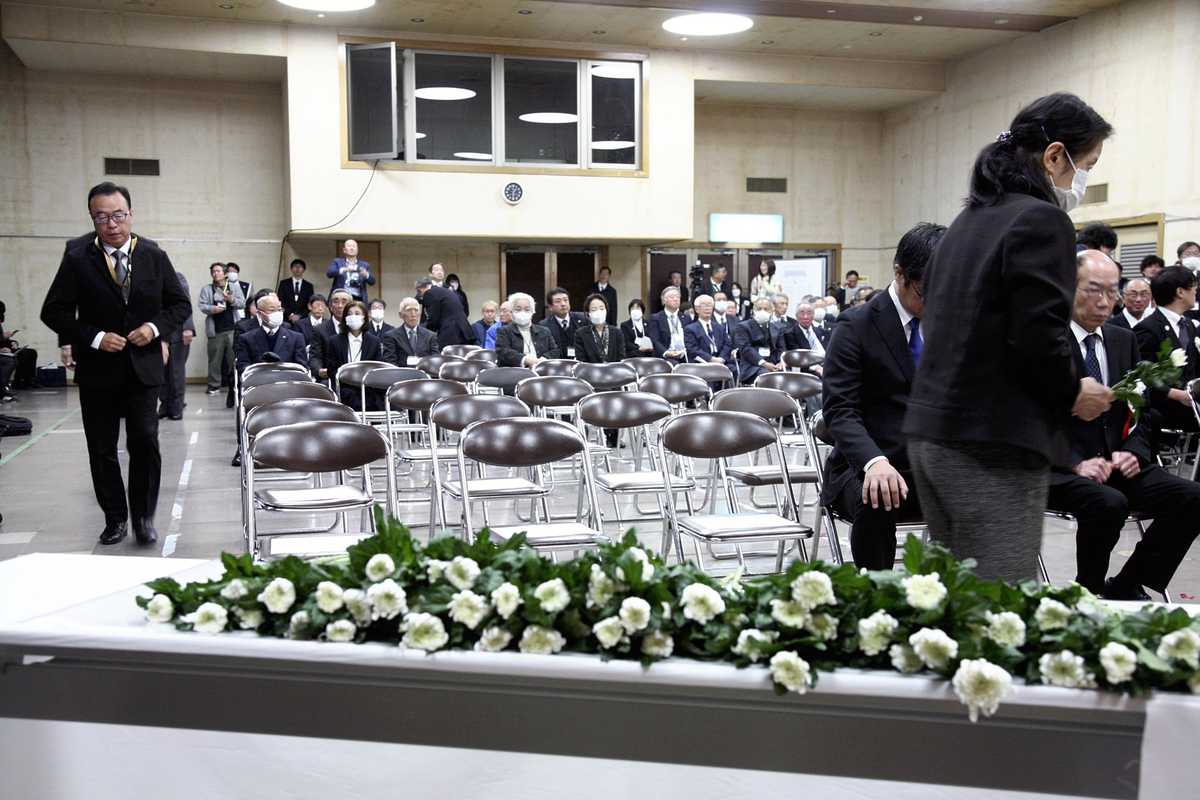Sado Gold Mines Situation Reveals Japan-Korea Historical Issues Still Smoldering; Tension Rises Ahead of 60th Anniversary of Ties

A memorial service to remember miners who worked at the now-defunct Sado Island Gold Mines is held in the absence of the South Korean delegation in Sado, Niigata Prefecture, on Sunday.
2:00 JST, November 28, 2024
Discrepancies between Japan and South Korea over a memorial ceremony for the Sado Island Gold Mines last weekend have once again highlighted the fact that historical issues between the two countries continue to smolder.
Despite their efforts to improve bilateral relations, the weak political administrations in both countries face a critical situation ahead of the 60th anniversary of the normalization of diplomatic ties next year.
On Tuesday, Foreign Minister Takeshi Iwaya and his South Korean counterpart Cho Tae-yul held a hastily arranged meeting on the sidelines of the Group of Seven foreign ministerial meeting in Italy. According to the South Korean government, the two agreed to properly manage the ceremony issue and maintain the “positive momentum” of improved relations.
On the same day in the Diet, House of Representatives Speaker Fukushiro Nukaga met with Korea-Japan Parliamentarians’ Union Chairman Joo Ho-young and confirmed their commitment to promoting parliamentary diplomacy. Former Prime Minister Yoshihide Suga, who serves as the union’s head on the Japan side, is expected to visit South Korea in mid-December.
Joo, however, said at the meeting, “There is very strong public criticism in South Korea regarding the ceremony, and the issue weighs on me.”
A memorial ceremony was held Sunday on Sado Island in Niigata Prefecture to remember all those who worked at the now-defunct gold mines. The mines were designated as a UNESCO World Heritage site earlier this year.
As for the mines’ UNESCO registration, the South Korean media had been critical from the outset of the fact that an on-site exhibition at the mines did not stipulate that people from the Korean Peninsula had been “forced to work” there. When it was learned that Parliamentary Vice Foreign Minister Akiko Ikuina was attending the ceremony, a false report from Kyodo News saying that she had visited Yasukuni Shrine in the past triggered stronger criticism in the country.
There was also a case this spring when Japan’s Internal Affairs and Communications Ministry issued an administrative guidance to LY Corp. — operator of the Line messaging app and Yahoo! Japan internet portal — to consider reviewing its capital relationship with the South Korean information technology giant Naver Corp. The move triggered a fierce protest from a South Korean opposition party, which linked the matter to historical issues by saying that Japan was “pillaging our cyber territory.”
South Korean opposition parties and the media have been stepping up their criticism out of dissatisfaction with President Yoon Suk Yeol’s administration making unilateral concessions for better relations with Japan, such as in the case of the lawsuits of former wartime requisitioned workers from the Korean Peninsula. The administration’s approval rate has also slumped due to a scandal involving Yoon’s wife, and the impetus for promoting diplomacy with Japan is fading.
Governing as a minority ruling bloc after the recent lower house election, the Cabinet of Prime Minister Shigeru Ishiba is also struggling with domestic affairs. It hopes to stabilize diplomacy through cooperation with South Korea as well as via trilateral efforts with South Korea and the United States.
Japan is keen to defuse the current situation as quickly as possible, with a senior administration official saying, “We want to resolve this matter peacefully.” However, if the 60th anniversary of the normalization of diplomatic ties brings the historical issues back into the spotlight, Japan will have to take the helm in a difficult situation.
Top Articles in Politics
-

Japan PM Takaichi’s Cabinet Resigns en Masse
-

Sanae Takaichi Elected Prime Minister of Japan; Keeps All Cabinet Appointees from Previous Term
-

Japan’s Govt to Submit Road Map for Growth Strategy in March, PM Takaichi to Announce in Upcoming Policy Speech
-

LDP Wins Historic Landslide Victory
-

LDP Wins Landslide Victory, Secures Single-party Majority; Ruling Coalition with JIP Poised to Secure Over 300 seats (UPDATE 1)
JN ACCESS RANKING
-

Producer Behind Pop Group XG Arrested for Cocaine Possession
-

Japan PM Takaichi’s Cabinet Resigns en Masse
-

Japan Institute to Use Domestic Commercial Optical Lattice Clock to Set Japan Standard Time
-

Man Infected with Measles Reportedly Dined at Restaurant in Tokyo Station
-

Israeli Ambassador to Japan Speaks about Japan’s Role in the Reconstruction of Gaza






















